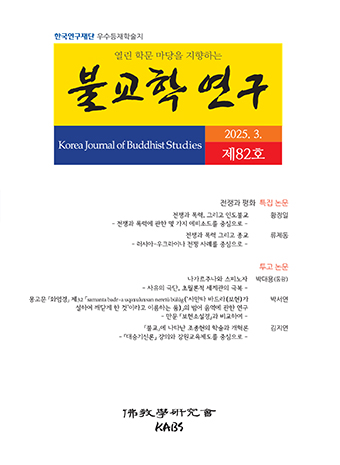Abstract
References
Sorry, not available.
Click the PDF button.
Information
This article investigates the emphasis on practice in the Buddhist apocryphal sutras(wei-jing, 僞經), focusing on the pedagogical aspects of the apocryphal sutras from the period of the Northern and Southern Dynasties including the Samadhi-Sutra of Liberation through Purification (淨度三昧經), the sutra of Supreme Penetration Vaipulya- Repentance Redemption-Adornment Enlightenment (大通方廣懺悔滅罪莊嚴成佛經), and the sutra of the Original Acts Adorning the Bodhisattvas (菩薩瓔珞本業經). This research reveals that the apocryphal sutras have functioned as sutras for minjung, or the alienated people of their eras. Some distinctive characteristics of the wei-jing are the following: Firstly, the apocryphal sutras generally put their emphasis on the ethical moralities such as the five precepts, part of the universal norms of Buddhism, while, on the other hand, focusing on the causal retributions and prayers for blessing that are suitable for people living in the latter days of the Buddhist dharma. Secondly, the apocryphal sutras try to teach a faith that requires practical reflections on the realities of our lives rather than a faith based on philosophical speculations. They also aim to transform escapism caused by social instabilities into practical reflections on realities. Thirdly, the emphasis on practice goes beyond mere criticisms against contemporary Buddhist societies, to the changes of mind and behaviors by continued accumulation of practical acts. In other words, every single act of practicing good deeds and receiving precepts is to mature the mind rooted in the Buddha nature. Therefore, the emphasis on the practical acts of the apocryphal sutras highlights that the primary needs of ordinary people are not profound philosophical arguments but in fact practical acts in their real lives here and now. The apocryphal sutras emphasize the universal ethics and moralities of precepts and acts, and, based on their views of the afterlife, purgatory, and divine beings, explain eventual rewards and punishments according to the precepts. The apocryphal sutras do not strictly insist on the importance of keeping the precepts or violating them. They rather try to lead followers, by their repentance and practical reflections in everyday lives, to have a faith in the salvific powers of the Buddhas and Bodhisattvas.In doing so, apocryphal sutras stress the significance of practical mind and acts here and now, and eventually promote the manifestation of self-nature through continued practices. The pedagogical significance of the apocryphal sutras, first of all, is that they lead us to transform our lives by encouraging ordinary people to participate actively in the practice of good deeds and precepts, to reflect on their own lives, and to improve their status of mind and acts. Secondly, the sutras stimulate voluntary motivations to form a seed of mind and acts by the benefits which result from the merits of the transformation of mind and practice. It is true that, even by alluding to the prosperities and punishments in this life, the apocryphal sutras slowly but steadily help people change their mind and behaviors.
위경은 인도와 중국의 문화적 차이를 극복하고, 유·도 양가의 비판에서 불교를 보호하기 위해 찬술된 것으로, 당시 의례의식의 모습이나 찬술 당시의 불교교단의 모습과 인도불교와는 다른 중국불교만의 독자성, 그리고 민중들의 불교신앙과 실천 등에 대한 다양한 내용을 담고 있다. 본 논문은 남북조시대의 찬술경전으로서 『淨度三昧經』, 『大通方廣經』, 『菩薩瓔珞本業經』을 중심으로, 위경이 갖는 여러 특징들 중에서 일상생활에서의 실천행의 요소들을 통해 민중들에게 어떤 교육적 의미를 부여하고 있는지를 고찰한 것이다.위경이 민중에게 일상생활에서 실천해야 할 행위로 강조하는 특징과 실천행을 강조하는 이유에 대해,첫째, 말법시대에 적합한 구복의 인과응보에 초점을 맞추면서도 결코 보편적 진리를 벗어나지 않는 五戒 등의 윤리도덕을 강조한다. 인과응보의 지옥관과 내세관 등이 결부되면서 명확한 상벌의 윤리도덕을 설정하고, 이를 통해 적극적인 선의 실천을 이루게 한다.둘째, 기존의 철학적 신앙의 형태를 벗어나 실천적이고 자신의 현실에 대한 반성을 요구하는 신앙을 설정한다. 사회의 불안정에 대한 현실도피를 현실 속에서의 반성과 실천으로 전환한다.셋째, 실천행의 강조가 단지 기존 불교계에 대한 비판만을 향한 것이 아니라, 행동 하나하나의 실천에서 오는 마음의 변화를 이루게 한다. 다시 말해, 戒를 받고 적극적으로 선을 실천하는 행동 하나하나가 佛性에 기반한 마음의 증장을 이루게 한다는 것이다.위경은 누구나 인정할 수 있는 보편적 윤리도덕을 강조하고, 受戒와 持戒에 따른 상벌을 강조하는 것이다. 또한 계의 持犯에 얽매이기 보다는 참회를 통한 현실 속에서의 반성과 실천을 불보살의 위신력이라는 신앙으로 유도하는 것이다. 위경은 일상생활 속에서 실천하는 마음과 행의 중요성을 일깨워주고 있으며, 하나하나의 실천행으로 마음의 증장을 이루고 종국에는 本性의 발현이 자연스럽게 일어날 수 있도록 한다.위경이 갖는 교육적 의미는, 첫째로 삶의 개선을 유도한다는 것이다. 오계의 실천이라는 적극적인 선의 실천으로 민중들의 눈에 맞추어서 자신의 삶을 반성하고, 마음과 행의 변화를 유도하고 있기 때문이다. 둘째로 자발적인 동기를 제시한다는 것이다. 마음과 행의 변화에서 오는 공덕은 그 행의 이로움 때문에 다음의 마음과 행을 이어가는 씨앗이 될 것이다. 그것을 현세의 부귀와 지옥 등으로 유도한다고 하더라도, 분명 자신의 행에 대한 마음의 변화를 조금씩 자각할 것이기 때문이다.
Click the PDF button.
- Publisher :Korean Association of Buddhist Studies
- Publisher(Ko) :불교학연구회
- Journal Title :Korean Journal of Buddhist Studies
- Journal Title(Ko) :불교학연구
- Volume : 29
- Pages :93 ~ 124


 Korean Journal of Buddhist Studies
Korean Journal of Buddhist Studies






